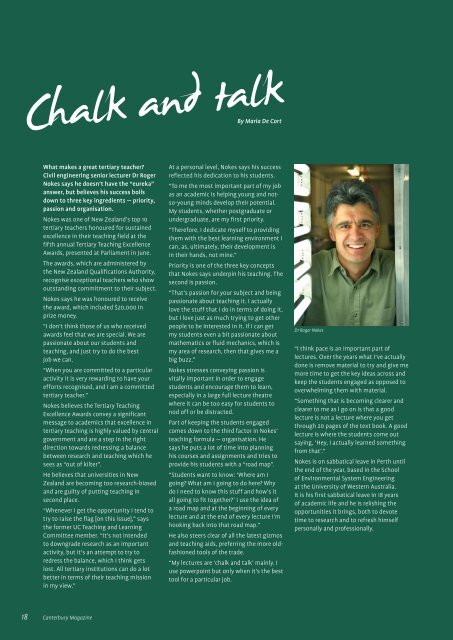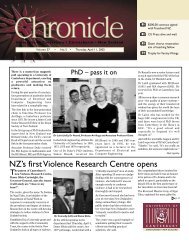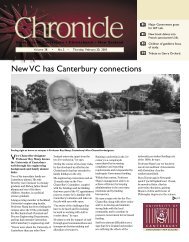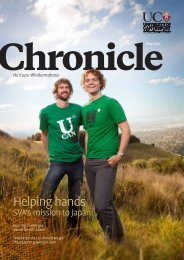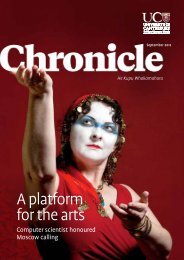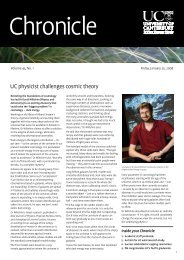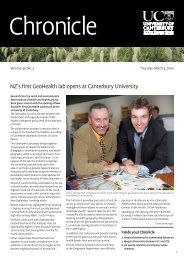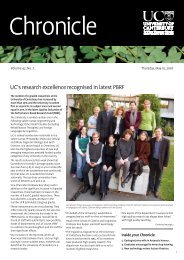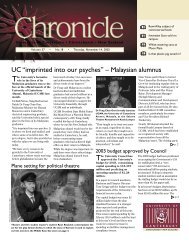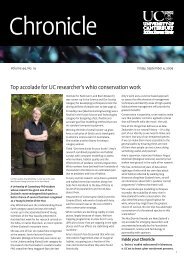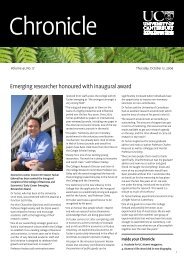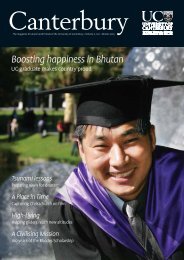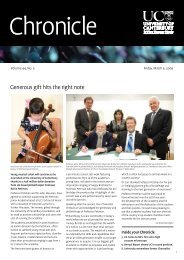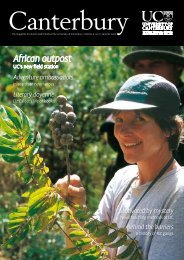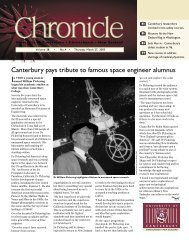Download - Communications and Development Department ...
Download - Communications and Development Department ...
Download - Communications and Development Department ...
You also want an ePaper? Increase the reach of your titles
YUMPU automatically turns print PDFs into web optimized ePapers that Google loves.
Chalk <strong>and</strong> talkBy Maria De CortWhat makes a great tertiary teacher?Civil engineering senior lecturer Dr RogerNokes says he doesn’t have the “eureka”answer, but believes his success boilsdown to three key ingredients — priority,passion <strong>and</strong> organisation.Nokes was one of New Zeal<strong>and</strong>’s top 10tertiary teachers honoured for sustainedexcellence in their teaching field at thefifth annual Tertiary Teaching ExcellenceAwards, presented at Parliament in June.The awards, which are administered bythe New Zeal<strong>and</strong> Qualifications Authority,recognise exceptional teachers who showoutst<strong>and</strong>ing commitment to their subject.Nokes says he was honoured to receivethe award, which included $20,000 inprize money.“I don’t think those of us who receivedawards feel that we are special. We arepassionate about our students <strong>and</strong>teaching, <strong>and</strong> just try to do the bestjob we can.“When you are committed to a particularactivity it is very rewarding to have yourefforts recognised, <strong>and</strong> I am a committedtertiary teacher.”Nokes believes the Tertiary TeachingExcellence Awards convey a significantmessage to academics that excellence intertiary teaching is highly valued by centralgovernment <strong>and</strong> are a step in the rightdirection towards redressing a balancebetween research <strong>and</strong> teaching which hesees as “out of kilter”.He believes that universities in NewZeal<strong>and</strong> are becoming too research-biased<strong>and</strong> are guilty of putting teaching insecond place.“Whenever I get the opportunity I tend totry to raise the flag [on this issue],” saysthe former UC Teaching <strong>and</strong> LearningCommittee member. “It’s not intendedto downgrade research as an importantactivity, but it’s an attempt to try toredress the balance, which I think getslost. All tertiary institutions can do a lotbetter in terms of their teaching missionin my view.”At a personal level, Nokes says his successreflected his dedication to his students.“To me the most important part of my jobas an academic is helping young <strong>and</strong> notso-youngminds develop their potential.My students, whether postgraduate orundergraduate, are my first priority.“Therefore, I dedicate myself to providingthem with the best learning environment Ican, as, ultimately, their development isin their h<strong>and</strong>s, not mine.”Priority is one of the three key conceptsthat Nokes says underpin his teaching. Thesecond is passion.“That’s passion for your subject <strong>and</strong> beingpassionate about teaching it. I actuallylove the stuff that I do in terms of doing it,but I love just as much trying to get otherpeople to be interested in it. If I can getmy students even a bit passionate aboutmathematics or fluid mechanics, which ismy area of research, then that gives me abig buzz.”Nokes stresses conveying passion isvitally important in order to engagestudents <strong>and</strong> encourage them to learn,especially in a large full lecture theatrewhere it can be too easy for students tonod off or be distracted.Part of keeping the students engagedcomes down to the third factor in Nokes’teaching formula — organisation. Hesays he puts a lot of time into planninghis courses <strong>and</strong> assignments <strong>and</strong> tries toprovide his students with a “road map”.“Students want to know: ‘Where am Igoing? What am I going to do here? Whydo I need to know this stuff <strong>and</strong> how’s itall going to fit together?’ I use the idea ofa road map <strong>and</strong> at the beginning of everylecture <strong>and</strong> at the end of every lecture I’mhooking back into that road map.”He also steers clear of all the latest gizmos<strong>and</strong> teaching aids, preferring the more oldfashionedtools of the trade.“My lectures are ‘chalk <strong>and</strong> talk’ mainly. Iuse powerpoint but only when it’s the besttool for a particular job.Dr Roger Nokes“I think pace is an important part oflectures. Over the years what I’ve actuallydone is remove material to try <strong>and</strong> give memore time to get the key ideas across <strong>and</strong>keep the students engaged as opposed tooverwhelming them with material.“Something that is becoming clearer <strong>and</strong>clearer to me as I go on is that a goodlecture is not a lecture where you getthrough 20 pages of the text book. A goodlecture is where the students come outsaying, ‘Hey, I actually learned somethingfrom that’.”Nokes is on sabbatical leave in Perth untilthe end of the year, based in the Schoolof Environmental System Engineeringat the University of Western Australia.It is his first sabbatical leave in 18 yearsof academic life <strong>and</strong> he is relishing theopportunities it brings, both to devotetime to research <strong>and</strong> to refresh himselfpersonally <strong>and</strong> professionally.18 Canterbury Magazine


